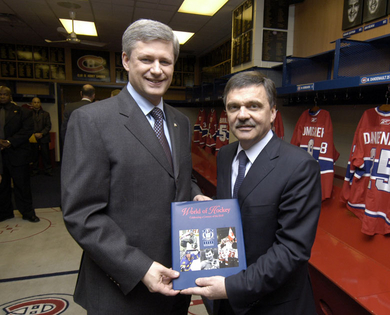MONTREAL – Plaques commemorating James Creighton – considered the “father of hockey” – and the Victoria Skating Rink were unveiled in a gala ceremony attended by Prime Minister Stephen Harper at Montreal’s Bell Centre. Also in attendance were IIHF President René Fasel and the Mayor of Montreal, Gérald Tremblay. The event was hosted by the Montreal Canadiens.
“It is very important for us, and an honour, to unveil these plaques during our centennial season,” Fasel said. “For us to have our Congress in Montreal as well, where the game was born, is a special part of the IIHF’s history.”
The plaques were created by Parks Canada on the advisement of the Historic Sites and Monuments Board of Canada. The unveiling was part of the IIHF’s 100 Year Anniversary Celebration. At the ceremony, James George Aylwin Creighton (1850-1930) was recognized as a person of national historic significance for his role in the development of ice hockey in the 1870s. The Victoria Skating Rink was also recognized as the birthplace of organized hockey.
The event was co-organized by Parks Canada, the Historic Sites and Monuments Board of Canada (HSMBC, the Government of Canada's expert advisory body on historical matters in Canada), the IIHF, Hockey Canada, the City of Montreal and the event host, the Montreal Canadiens.
 Canada’s Prime Minister and hockey historian Stephen Harper (left) was presented with the IIHF 100 year anniversary book by IIHF president René Fasel in the Montreal Canadiens locker room prior to the plaque unveiling ceremony. Photo: Alexandre Choquette / Parks Canada
Canada’s Prime Minister and hockey historian Stephen Harper (left) was presented with the IIHF 100 year anniversary book by IIHF president René Fasel in the Montreal Canadiens locker room prior to the plaque unveiling ceremony. Photo: Alexandre Choquette / Parks CanadaMore than 400 invited guests were in attendance at the ceremony which was held at the centre ice area of the 21,273-seat Bell Centre, the arena of the Montreal Canadiens, who will celebrate their 100 year anniversary in 2009. The ceremony was covered by 26 news outlets. The site of the Victoria Skating Rink is 150 metres from the Bell Centre.
James Creighton organized and brought together all the key elements of the modern game of ice hockey. He is widely believed to have initiated the earliest codification of the game's rules, and thus laid the foundation for its emergence as an organized sport. On March 3, 1875, he organized the first indoor match in the Victoria Skating Rink in Montréal. The game was announced in the Montreal Gazette, and the day after the game the newspaper provided a game recap.
Prime Minister Harper, an enthusiastic hockey historian, noted that for this historic match at the Victoria Rink, Creighton employed a puck instead of a ball and used goals in a game officiated by a referee. Two teams of nine men aside kept score, and Creighton’s team won, 2-1. All of these aspects characterize the modern game.
In addition to being a developer and popularizer of organized ice hockey, Creighton was the captain of McGill University, the first regular hockey club to be formed in Canada, in 1877. Creighton, who later served for 48 years as Law Clerk to the Senate, is thus referred to as the "father" of organized ice hockey.
In 2002, the IIHF officially recognized the Victoria Skating Rink as the birthplace of organized hockey and the world governing body pursued the opportunity to follow up the recognition with the unveiling of a commemorative plaque during the 100 Year Anniversary of the federation.
“For the preservation of the heritage of our game, for hockey fans all over the world, and for the world governing body of ice hockey, it is important to finally and officially recognize the site where the Victoria Skating Rink once stood and James Creighton as the person of hockey historic significance. Not many sports can as hockey, precisely identify the origins of its game. This is of great historical value to us,” said Fasel.
ANDREW PODNIEKS



